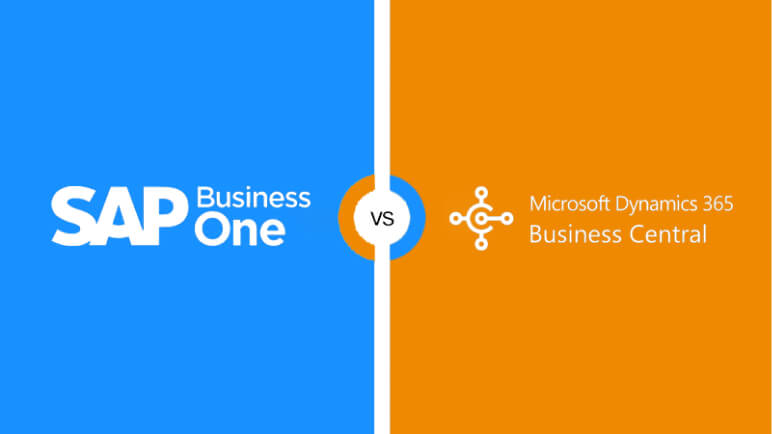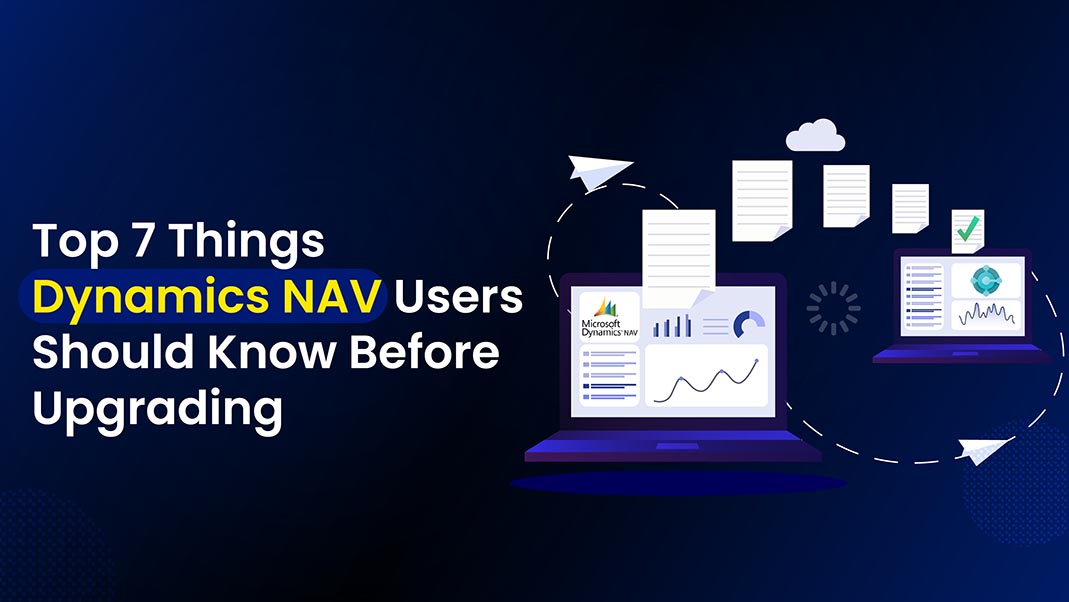Microsoft Dynamics 365 Business Central Vs Sap Business One: Which ERP system should you choose?
Cloud-based ERP system investment is a fantastic starting point. ERP software enables you to manage and integrate all aspects of your business, including financials, operations, planning, and reporting, into a single system.
Microsoft Dynamics 365 Business Central and SAP Business One are the current ERP market leaders. While both systems are designed for SMBs, Business Central typically performs better in areas like finance, human resources, and operations management.
Before deciding on an ERP, compare the fundamental differences between Microsoft Dynamics 365 Business Central and SAP Business One. Let’s examine it in greater depth.
Microsoft Dynamics 365 Business Central vs. SAP Business One
Microsoft Dynamics 365 Business Central (formerly Dynamics NAV) is a cloud-first ERP solution from Microsoft that focuses greatly on UX / UI (User Experience) sophistication (User Interface). Business Central is favored by organizations of all sizes and across a wide range of industries due to its intelligent capacity to handle a greater number of organizational types.
SAP Business One is an ERP solution developed and designed by SAP SE that features traditional-looking tools, interfaces, and capabilities. SAP B1 is primarily developed for small and medium-sized businesses, as its features are tailored to match their needs.
Dynamics 365 Business Central and SAP Business One Features
1. Productivity
- Dynamics 365 Business Central allows flexible manufacturing operation automation, hence facilitating production planning and cost management while also offering visibility into manufacturing operations.
- SAP Business One is effective in inventory management, but it is frequently regarded as extremely complex and not developed for future expansion.
2. Integrations
- Office 365, Azure, Outlook, and other Microsoft products can be seamlessly integrated with Microsoft Business Central.
- SAP Business One can be integrated with third-party apps, although each integration may require a unique tool.
3. Usability
- Business Central provides an exceptional user experience. In addition, it provides complete visibility across customer support, distribution, sales, and marketing, as well as real-time, accurate views of the data you need to make smarter decisions.
- Business Central is superior to SAP B1 in terms of debugging issues, human resource management capabilities, and dashboard and cockpit capabilities.
Pricing and Licensing
Microsoft Dynamics 365 Business Central
In this case, the Business Central Pricing information is readily available on the official website. It is licensed per user per month on three distinct tiers in its cloud mode:
- Team Member: $8 per user/month
- Essentials: $70 per user/month
- Premium: $100 per user/month
SAP Business One
SAP Business One costs $94 USD per user per month for a Professional License subscription and $54 USD per user per month for a Limited License subscription. SAP has no policy regarding price transparency, and their website has no pricing information. The listed prices are approximations; for exact pricing, you must contact a partner and get a quote.
Dynamics 365 Business Central vs SAP B1
| Features | D365 Business Central | SAP B1 |
|---|---|---|
| User-Friendliness | Multiple configurable tools and features with a user-friendly, intuitive web interface. | Standardized and conventional features with a slightly complicated user interface |
| Implementation and Integration | It synchronizes flawlessly with other Microsoft applications and is compatible with third-party applications. | Users need to rely heavily on third-party and SAP applications |
| Suitable for | A wide range of business sizes and industries | Small and Mid-size Enterprises |
| Customer Service | Full support that includes training | Support that does not come up with training |
| Application Add-Ons | 750 and more Add-ons | Around 40 |
| Pricing Alternatives | Options for monthly and one-time payments, as well as pricing based on an estimate, are available | Pricing is primarily quote-based |
| Platform Support | Desktop, Mobile, Tablets, and Cloud | Desktop, Mobile, Tablets, and Cloud |
Implementation Options
SAP Business One and Dynamics 365 Business Central can be deployed on-premise or in the cloud and are only available through a network of authorized partners.
After a customer purchases SAP B1, SAP provides them with access to an online assistance portal where they may learn how to configure, implement, and upgrade the software. Users can modify rights, generate reports, and extend the software using add-ons after logging into this help portal.
With Microsoft Business Central, deployment and support are performed exclusively by a Microsoft Dynamics partner, who provides fully customized service and assists you in the day-to-day management of a complex project.
Depending on the business
If your company grows, it is quite likely that it will outgrow SAP Business One, compelling you to either transfer to other SAP solutions with more functionality and, thus, higher costs or switch to a different solution altogether.
Business Central is utilized by a range of sectors and industries, including IT and medical services, food services, and distribution. It is scalable, so it will be valuable as your company expands globally. Business Central is a more stable platform that is capable of supporting a greater variety of business kinds.
Deployment and Adoption
Implementation-wise, SAP B1 gives less flexibility. SAP Business One implementations are required to have a minimum of 10 core modules, with no choice to remove them if the functionality they provide is not in the best interests of your organization.
Business Central, on the other hand, enables you to pick and choose individual modules to develop a bespoke solution that precisely fits your business.
Customizations
Both ERPs are capable of interacting with third-party applications and make custom-made customizations. It is also essential to consider the amount of developed solutions accessible when evaluating these options.
Microsoft Business Central is able to offer apps for Business Central that extend its capabilities for specific industries and businesses thanks to its large customer and partner network. Working on a solution that is specific to your company’s needs eliminates future problems, particularly when it is initially focused on employee productivity and processes.
Microsoft Business Central features a substantial number of apps after only a few years on the market. In its App source Marketplace, the solution has over 550 complementary solutions in the form of apps.
In addition to these customized settings, there are options for easy integration and synchronization with a vast array of other Microsoft products. Microsoft products such as Business Central and Office 365 are naturally easy to integrate. Also, using APIs, Webservices, file sharing, and other means, you can interact seamlessly with third-party products.
SAP presently does not match these figures: The App Center provides 73 applications for Business One. Today, this thinking is more focused on the client’s specific development. While the solution will be customized anyway, it is necessary to address the hidden cost of maintaining customizations over time.
Enhancements and Expandability
Because both programs operate in the cloud, version upgrades are implemented automatically. You will always use the most recent version of the software.
As stated previously, Business Central Microsoft is compatible with a wide range of countries and languages and enables your organization to scale without difficulty. Its execution capability and graphical user interface provide an outstanding user experience.
Microsoft is also a pioneer in integrating new technologies such as AI, mixed reality, IoT, and a plethora of Azure-developed capabilities into its ERP.
Functionality
SAP Business One is generally utilized by organizations with a focus on people and services; nevertheless, its support for more complex use cases involving products faces certain obstacles.
Business Central includes a CRM as part of its ERP features; however, native integration with Dynamics 365 for Sales, which is licensed separately, is available for situations requiring more specific sales capabilities.
Microsoft’s operational map is comprehensive, and its functionality and native integration with the Azure platform, Power Platform, and the rest of the Microsoft suite of tools enable it to achieve enhanced capability for a range of business cases.
Business Central serves a variety of industries, such as healthcare, retail, manufacturing, distribution, and food services. By implementing a better platform, the capacity to scale and assist businesses is greatly improved.
Conclusion
The ERP solution you choose depends on the unique needs of your business. Both Business Central and SAP B1 have good features, but for small and medium-sized businesses looking for scalability and expansion, Business Central is frequently the better option.
Dynamics Business Central outperforms the SAP Business One. D365 BC offers flexibility, scalability, and cheaper deployment and ownership costs to SMBs and large organizations.
Business Central may be the optimal choice for integrating your company’s business applications, productivity, communication, and collaboration tools, as it integrates seamlessly with the Microsoft products your company already uses.
Contact us today to learn more about how Microsoft Dynamics 365 Business Central can benefit your organization.




